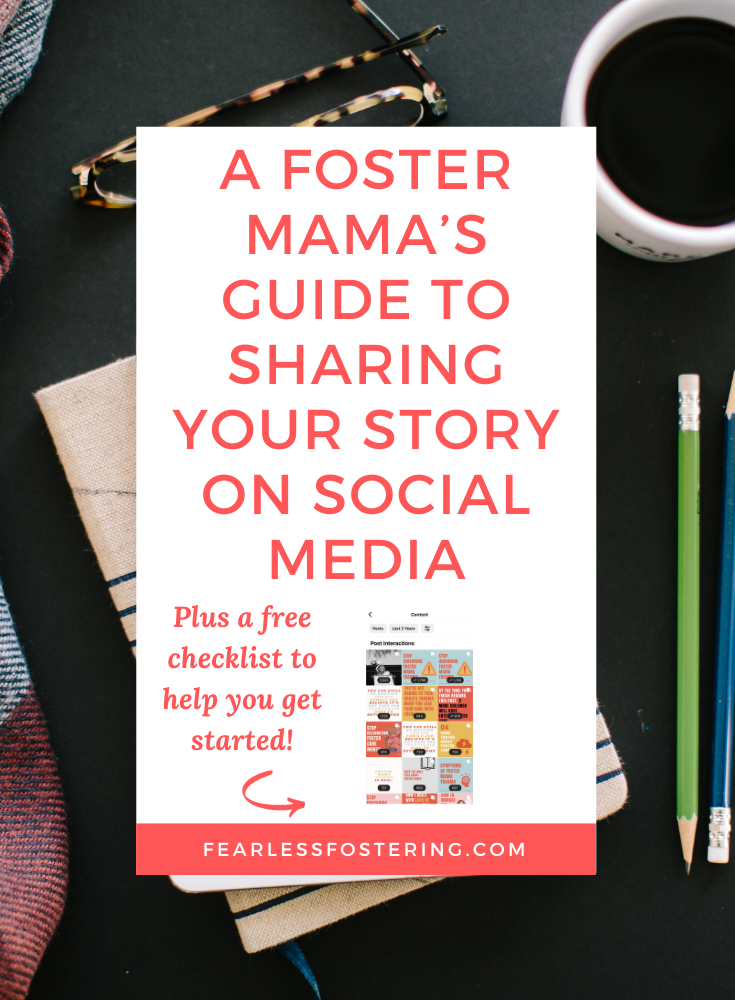
As you navigate the ups and downs of foster care, you may find yourself wanting to share your experiences on social media. Whether it’s to connect with other foster parents, raise awareness about fostering, or simply document your personal growth, telling your story online can be a powerful and meaningful endeavor. In this episode, we’ll explore some valuable tips for foster mamas who are considering sharing their journey on social media. Additionally, make sure to check out my free checklist, where I share all the tools I use to support foster mamas online.
-
Establish Your Why
Before delving into the world of social media, take a moment to reflect on why you want to share your foster care journey. Is it to connect with other foster parents for support? Are you hoping to educate and raise awareness about the foster care system? Or maybe you simply want to document your experiences for personal growth and reflection. Clearly defining your purpose will guide your content creation and help you stay focused on your goals.
-
Protect Privacy and Confidentiality
Foster care involves protecting the privacy and confidentiality of the children in your care. Before sharing any content on social media, familiarize yourself with the guidelines and regulations set by your county, state, or agency. Always prioritize the well-being of the children by avoiding the use of their real names, not sharing identifiable information, and refraining from posting images that could compromise their privacy.
-
Create a Separate Foster Care Account
Consider creating a separate social media account specifically for your foster care journey. This provides a dedicated space for sharing your experiences without mingling them with your personal life. It also allows you to connect with a community of foster parents and individuals who share similar interests and challenges. This separation can be particularly helpful in managing privacy concerns and maintaining a focused narrative.
-
Tell Your Story Authentically
Authenticity resonates with audiences on social media. Share your experiences, both the highs and lows, in an open and genuine manner. Foster mamas often find solace and support in knowing that others face similar challenges. Be real about the struggles you encounter, the victories you celebrate, and the lessons you learn along the way. Authentic storytelling fosters a sense of community and understanding among your followers.
-
Educate and Raise Awareness
Use your platform to educate your audience about foster care and dispel common myths and misconceptions. Share statistics, information about the foster care system, and your personal insights into the process. By raising awareness, you contribute to a better understanding of the challenges faced by foster families and help create a more supportive community.
-
Connect with Other Foster Parents
Social media provides a unique opportunity to connect with other foster parents. Seek out groups, hashtags, and accounts dedicated to foster care. Engage with the community by commenting on posts, sharing your own experiences, and offering support to fellow foster mamas. Building these connections can be incredibly enriching and help you feel part of a larger network of individuals who understand the unique challenges of foster care.
-
Use Visual Storytelling
Incorporate visual elements into your storytelling. Share photos and videos that capture the essence of your foster care journey. Visual content is more engaging and can effectively convey emotions and experiences. However, always be mindful of privacy considerations, ensuring that any images shared protect the identities and privacy of the children in your care.
-
Set Boundaries
Social media can be consuming, so it’s crucial to set boundaries to protect your well-being and the well-being of your family. Establish a posting schedule that works for you, and don’t feel pressured to share every aspect of your life. It’s okay to keep certain details private and only share what feels comfortable and appropriate for you and your family.
-
Educate Your Audience About Foster Care Ethics
Take the opportunity to educate your followers about the ethical considerations of sharing foster care stories on social media. Emphasize the importance of respecting the privacy of the children and complying with your county or state guidelines. By providing this education, you contribute to a culture of responsible storytelling within the foster care community.
-
Promote Resources and Support
Share valuable resources, tips, and support services for fellow foster parents. Your platform can become a hub for information, connecting others with helpful resources and creating a supportive space for discussion. Speaking of which, I have a free checklist available for download, where I share all the tools I use to support foster mamas online. This checklist is a great resource for those looking to navigate the online space effectively, whether you want to create and share resources with your audience or not.
Sharing your foster care journey on social media can be a fulfilling and impactful way to connect with others, raise awareness, and build a supportive community. By approaching it with authenticity, respect for privacy, and a clear purpose, you can create a positive and meaningful online presence. Remember to download my free checklist, where I share all the tools I use to support foster mamas online.
May your social media journey be a source of inspiration, support, and connection as you continue to make a difference in the lives of the children in your care.
+ show Comments
- Hide Comments
add a comment